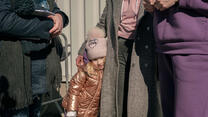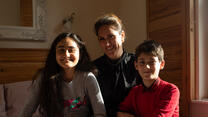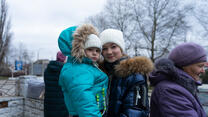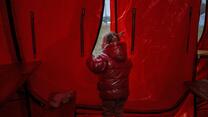The IRC provides relief to millions of refugees and displaced people who have had to leave their homes due to conflict and crisis. We also support refugees seeking safety and starting new lives in the UK, Europe and other countries.
You can help refugees by becoming a supporter of the IRC today.
How can I help refugees in the UK and beyond?
There are several ways that individuals can help support refugees within their own communities, across the UK, and overseas.
- Become a sponsor. Official government schemes such as Homes for Ukraine allows people with a spare room to register and host a refugee.
- Community sponsorship. Community sponsorship allows a group of people to sponsor a resettled family to join their local community. As a group, this responsibility involves welcoming the family, providing housing, and helping the family settle into their new community, with support finding jobs and enrolling in local schools.
- Donate items. Some charities collect urgently needed items for refugees. These include things like tinned and dry food, bedding, clothes, baby clothes, blankets and shoes.
- Volunteer. Research local groups and communities who support refugees and see how you could help.
- Donate money. Whether you can donate yourself or are in a position to run a fundraising event, supporting charities like the IRC who work closely with refugees is one of the best ways to help vulnerable displaced people around the world. Donate to the IRC today.
- Play our charity lottery. Our Win + Welcome weekly lottery has cash prizes of up to £500 every week. You’ll also be supporting our work and helping refugees.
How the IRC helps refugees in the UK
The IRC runs multiple programmes in the UK to support refugees, asylum seekers and other vulnerable migrants from Syria, Afghanistan, Ukraine, Iraq, Sudan and other countries, and equip them with the knowledge they need to become self-sufficient. These programmes focus on economic well being, education, health, power and safety.
Integration support
Cultural orientation for newcomers is provided in the refugee’s own language and helps them learn how to navigate and use British institutions. This guidance includes learning how to enrol children in local schools and access English lessons, how to support health and wellbeing using the NHS, and introductions to law enforcement and emergency services.
The programme includes Women’s Sessions, addressing female-specific barriers—such as gender-based violence—and female-specific healthcare.
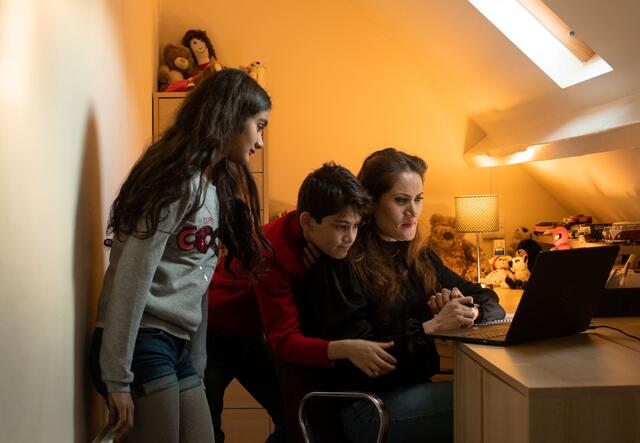
Community Interpretation Training
This training provides an introduction on how to interpret and translate language on behalf of individuals or small communities. It also provides the opportunity to become certified, which can lead to future job opportunities.
Employment support
Employment Specialists work with refugees on a one-to-one basis to provide counselling and support getting a job placement. Employment Readiness Training helps individuals with job-searching, applications, interviewing, and knowing their labour rights.
The Refugee Employability Programme (REP) is a UK Government-funded programme to support refugees in the South West to integrate into life in the UK, contribute to the economy and build a sustainable and long-term future.
Find out more about the Refugee Employability Programme (REP) here.
Healing Classrooms
This free teacher training offers a series of online sessions and in-person workshops to help teachers and support staff to better support refugee children to heal and thrive in an academic setting. The Healing Classrooms training focuses on social emotional development and helps build children’s skills and improve behaviour, performance, and wellbeing.
The IRC also works with schools hosting refugee children to better understand the culture and education system of students arriving from Ukraine and Afghanistan.
Leadership programme
For new refugees arriving in the UK, having someone who can empathise with your situation is invaluable. The IRC matches refugee mentors who have already settled in the UK with new arrivals who they then support with practical advice, friendship and encouragement.
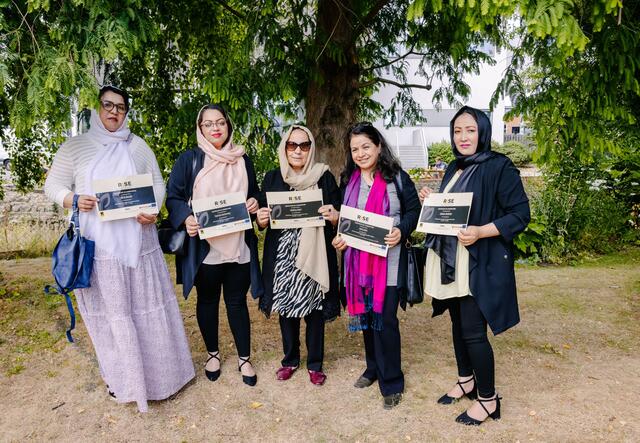
Attendees are asked to give their feedback during focus groups and in surveys, which is used to make improvements to future UK programmes. The IRC is currently piloting a refugee advisory board that will help identify areas for new projects within the UK.
Find out more about how the IRC is supporting refugees in the UK.
Helping Ukrainian refugees in the UK
Over 140,000 Ukrainians have arrived in the UK via one of the visa schemes and over 20,000 Ukrainians already living in the UK have applied for an extension to remain.
None of these people expected to start a new life in a new country. To assist them, the IRC offers programmes with the following support:
- Cultural orientation to help people access services.
- Training to help people find and apply for work.
- Mental health and psychosocial support (MHPSS).
- Advice on legal rights and how to exercise them.
- Training service providers so they can provide high-quality services to Ukrainians.
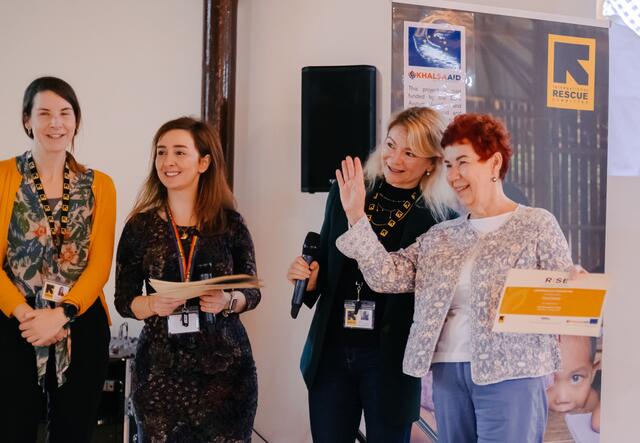
Our policy advocacy work in the UK
IRC believes that the UK must play its part in the global responsibility of resettling refugees and providing safety to those who need it. Our advocacy and policy work aims to create a fair and sustainable refugee protection system that ensures people coming to the UK are welcomed and are given the support they need.
We work across resettlement, asylum and integration policy, and suggest how the UK can better support refugees in the future.
Our recommendations for the way forward include:
1. Creating and improving pathways to safety
This includes allocating places in existing schemes more swiftly and responding to the scale of need. The government should also commit 10,000 places per year on the UK Resettlement Scheme (UKRS) to reflect global needs, and include provision for emergency cases.
Community sponsorship places should be considered as additional to government resettlement places and include robust safeguarding measures as well as tailored support for sponsors.
2. Improving integration with communities
The government should create a national strategy for integration that ensures:
- Integration services are available from arrival.
- Language support is increased and meets each individual’s needs.
- Tailored support is available to help individuals find work faster, including helping them to re-enter previous professions in which they are qualified from their home countries.
3. Prioritising refugee issues within the government
The government should reinstate the post of Minister for Refugees to ensure that refugee protection is represented, prioritised, and coordinated across the government.
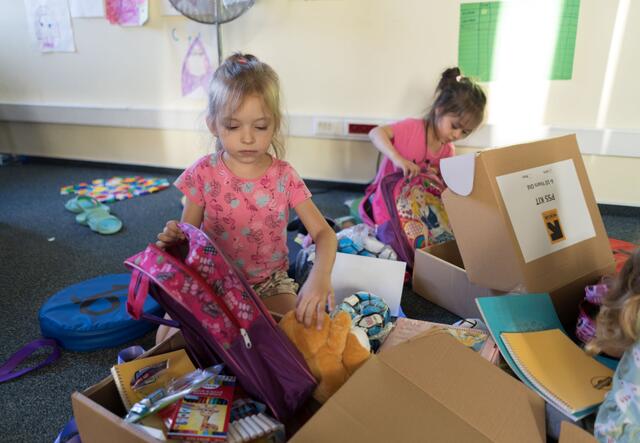
How we help refugees around the world
We work inside conflict-affected countries and, as well as neighbouring countries as where the majority of displaced people flee to countries that border their origin country.
Here are just a few of the places around the world where we work to deliver aid and help pave the way for long-term recovery.
Gaza
There is an imperative to reduce the death and suffering of the civilian Palestinian population in Gaza. Following the work of IRC assessment teams on the ground, and commencement of aid flows from Egypt to Gaza, the IRC is initiating a response to the humanitarian crisis arising from the current conflict. We have a team on the ground in Egypt and are working with partners to deliver supplies and provide bespoke and specialist support in fields of health, water and sanitation, child and women’s protection and psycho-social interventions.
We will be using the dedicated systems we have developed in a range of contexts, including robust monitoring and due diligence, to help ensure that aid reaches the civilians who desperately need it.
Syria
Twelve years of war in Syria have left millions displaced and in need of aid. 6.7 million people are still displaced inside Syria and it remains one of the deadliest places for humanitarian aid workers.
In the Syria region, and three neighbouring countries, we have more than 2,000 aid workers and volunteers providing emergency relief and long-term support to Syrians fleeing violence. We focus on health care, protecting vulnerable women and children, education, and economic recovery.
Europe
The IRC supports 15 countries in Europe—including Italy, Germany, and Serbia—to welcome people fleeing war and persecution.
Greece
In 2015, the IRC was the first international aid organisation to support refugees arriving on the island of Lesvos in Greece, and we continue to work there today supporting the most vulnerable refugees. We do this by helping new arrivals understand their legal rights, and providing mental health support. We also help protect women and children from exploitation.
As the majority of refugees in Greece will likely settle there, we work with local partners to ensure that refugees are integrated into their new communities.
Ukraine and Poland
In response to the emergency in Ukraine, IRC teams deployed to Poland to assist arriving refugees. We work with local organisations who are already on the ground to provide emergency assistance, cash support, and mental health support.
In Ukraine, we are supporting evacuation efforts for women and children, providing psychological care and delivering groceries, blankets, warm clothes, stoves, cash and other essentials to displaced families.
